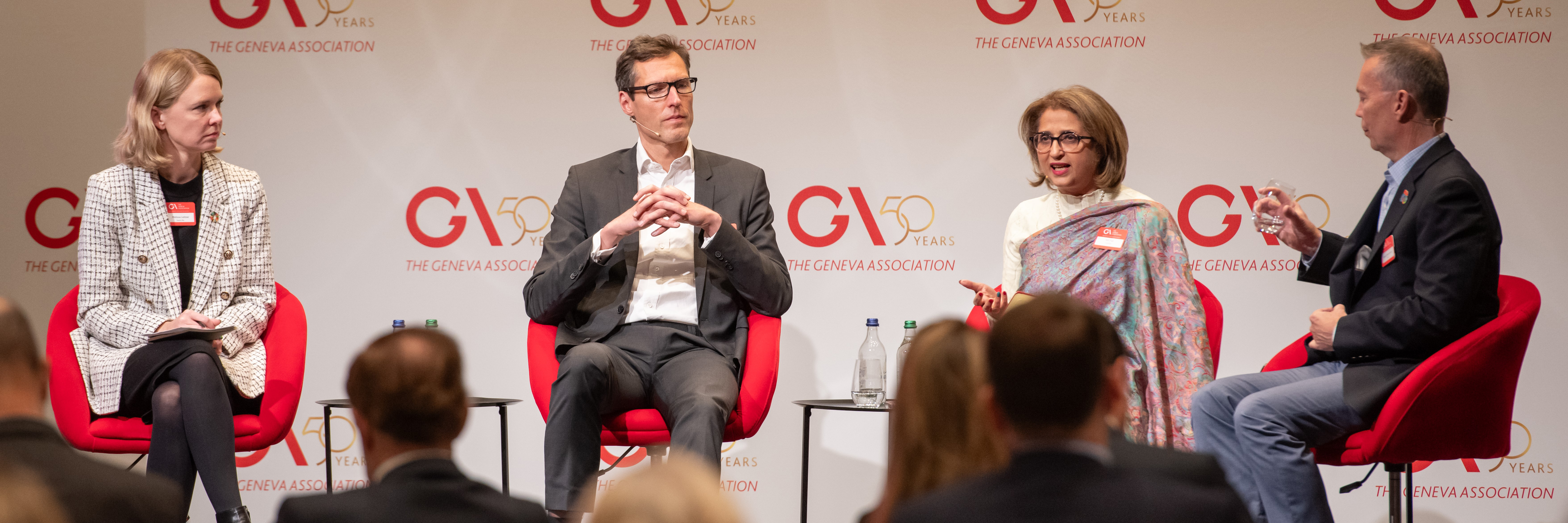Panel: What Will Insurers Look Like in 2050?

Christian Mumenthaler, CEO, Swiss Re, and Chairman, The Geneva Association; Rogério Campos Henriques, CEO, Fidelidade; Charles F. Lowrey, Chairman & CEO, Prudential Financial; Jessica Tan, Co-CEO, Ping An
A panel of insurance CEOs – representing America, Europe and Asia; P&C and life; and direct insurance and reinsurance – offered their views on how trends related to demography, geopolitics, technology, sustainability and the risk landscape will shape insurance in the decades to come.
Insurers can adapt their businesses to demographic shifts in two main ways. First, in developed countries where populations are ageing, insurers should increase their penetration with relevant accident, health and retirement products. Second, insurers should further diversify to markets where populations are increasing – and there is business growth potential – to offset the impacts of shrinking populations elsewhere.
Trust in institutions has been declining over the past 15 years, manifesting in protectionism, a reshuffling of value chains and geopolitical uncertainty overall. Global fragmentation disrupts the system of diversification that re/insurers have long relied on.
Technology has the great potential to expand customer access to insurance as well as reduce costs for insurers. Insurers can leverage AI to help customers make better decisions. Offering simplified products online or via hybrid methods – and using technology to speed up distribution – can increase customer uptake.
Large-language models now use 100s of billions of variables, compared to less than 1,000 five years ago. Generative AI can help prevent claims fraud, as well as increase efficiency. There remain, however, many situations where the ‘human touch’ is necessary.
Pressure is mounting for businesses to become net zero by 2050. For insurers, Scope 1 emissions, those of their own company, and Scope 2 emissions, related to energy, are relatively straightforward. But 95% of an insurer’s footprint is outside its own walls, under Scope 3. Upstream, all suppliers need to be net zero. Downstream, insurers must reduce the carbon footprint of their investments and their insurance policies. Metrics for the latter are much less developed, but progress is expected in the coming years. In the world more broadly, the overhaul needed to decarbonise industrial processes is an unprecedented challenge for humankind.
Finally, will insurability challenges around extreme risks, from NatCat to cyber, reduce the relevance of insurance in 25 years’ time? Protection for tail risks like a pandemic or a nuclear event do require government involvement. In motor, technology is likely to prevent accidents and even theft, so risks may decrease. But the relevance of and demand for other products will continue and even increase – for example, life insurance and liability insurance. Insurers should focus on the sustainability of their businesses, whether that means enduring different economic cycles or diversifying into service-oriented products.

















